Introduction
Addiction recovery is a journey that extends far beyond the confines of traditional treatment programs. Community service and support networks play a critical role in building a foundation for sustained recovery. Engaging with the community, both as a participant and as a contributor, enhances mental health, cultivates meaningful relationships, and fosters a robust support system vital for overcoming addiction. This article delves into the transformative power of community service in addiction recovery, offering insights into how individuals can leverage these resources for a successful sobriety journey.
The Therapeutic Role of Community
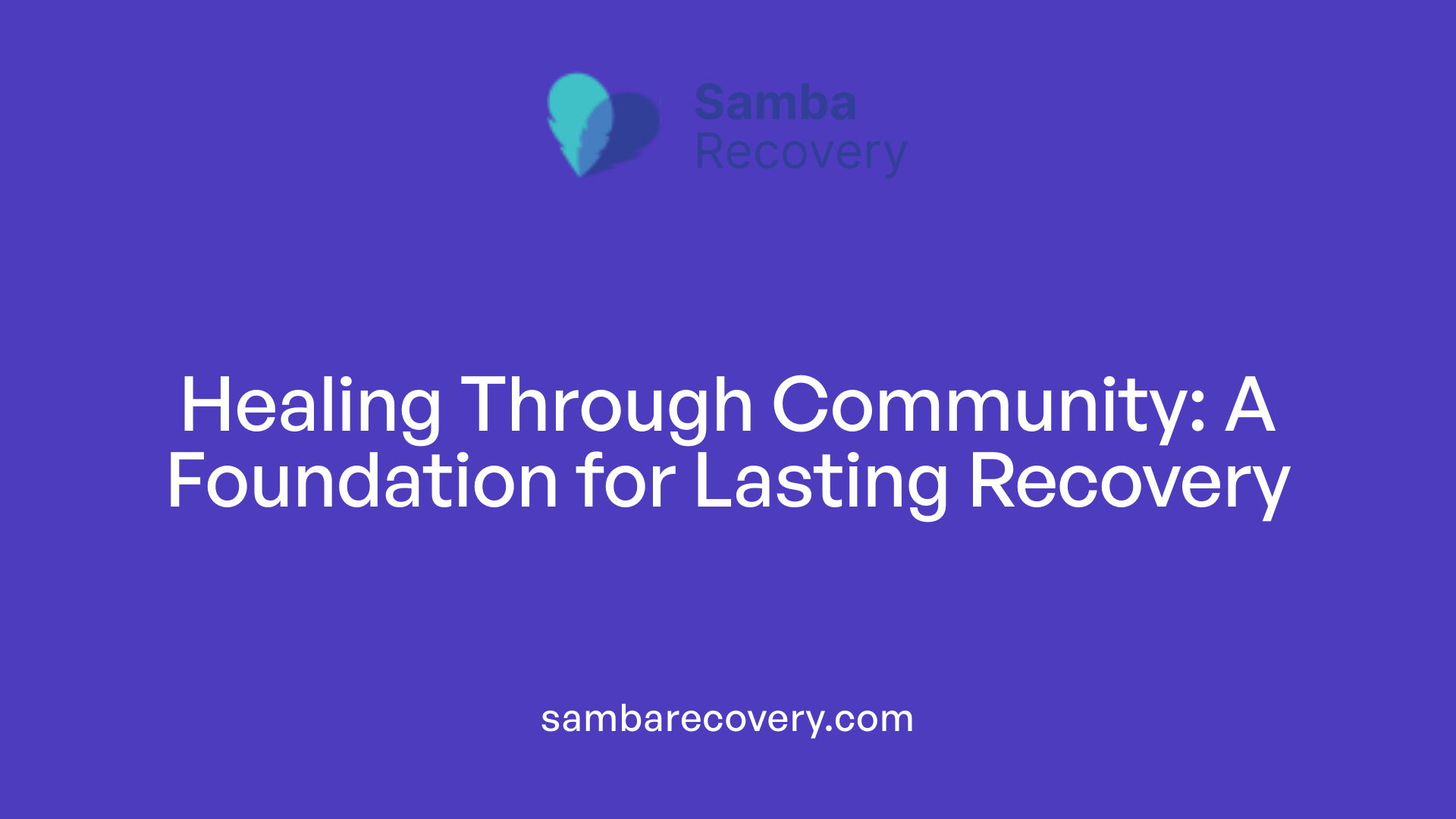
What is the role of community in addiction recovery?
Community support plays a fundamental part in the journey toward sobriety. It provides individuals with a network of understanding peers who share similar experiences, creating a sense of belonging and reducing feelings of loneliness and isolation.
Engaging in community activities, such as support groups like Alcoholics Anonymous (AA), Narcotics Anonymous (NA), or secular organizations like SMART Recovery, offers ongoing encouragement, accountability, and shared learning. These environments promote healthy lifestyle habits and offer social opportunities that reinforce sobriety.
Beyond peer groups, community centers and recovery programs present various resources including workshops, counseling, and recreational activities that nurture physical health and mental well-being. Whether through faith-based groups, volunteer initiatives, or recovery cafés, being part of a community fosters resilience and builds a support system vital for long-term recovery.
Overall, community involvement enhances motivation, provides structure, and helps individuals develop new skills and relationships. These factors collectively create a sustainable environment where continuous recovery is supported by collective strength, shared purpose, and support networks.
Impact of community engagement on reducing relapse
Participation in community activities significantly lowers the risk of relapse by maintaining engagement and offering positive distractions from cravings or triggers. Regular attendance at support meetings and involvement in sober social events promote stability and accountability.
Research indicates that active participation in peer support groups correlates with higher abstinence rates and improved treatment engagement. Community programs also aid in managing stress and emotional challenges that might otherwise lead to relapse.
Community support also provides practical help, such as transportation, employment assistance, and housing, which are crucial for maintaining sobriety. Access to these resources combined with emotional backing fosters confidence and creates a safe environment for individuals to recover and thrive.
Creating a sense of belonging and accountability
A strong community nurtures a sense of purpose and accountability, which are critical elements in recovery. Having a support network helps individuals set personal goals and stay committed by encouraging shared responsibility.
Volunteering is an effective way to build these connections, as it boosts self-esteem and provides structure. Helping others not only furthers personal growth but also reinforces the individual’s commitment to sobriety.
Community involvement teaches important social skills such as empathy and listening, which improve interpersonal relationships and create a dependable support system. Being held accountable within a community setting inspires consistency and resilience.
In summary, a well-connected recovery community offers essential emotional and practical resources, making recovery a shared journey rooted in mutual support, responsibility, and personal growth.
Volunteering: A Path to Empowerment
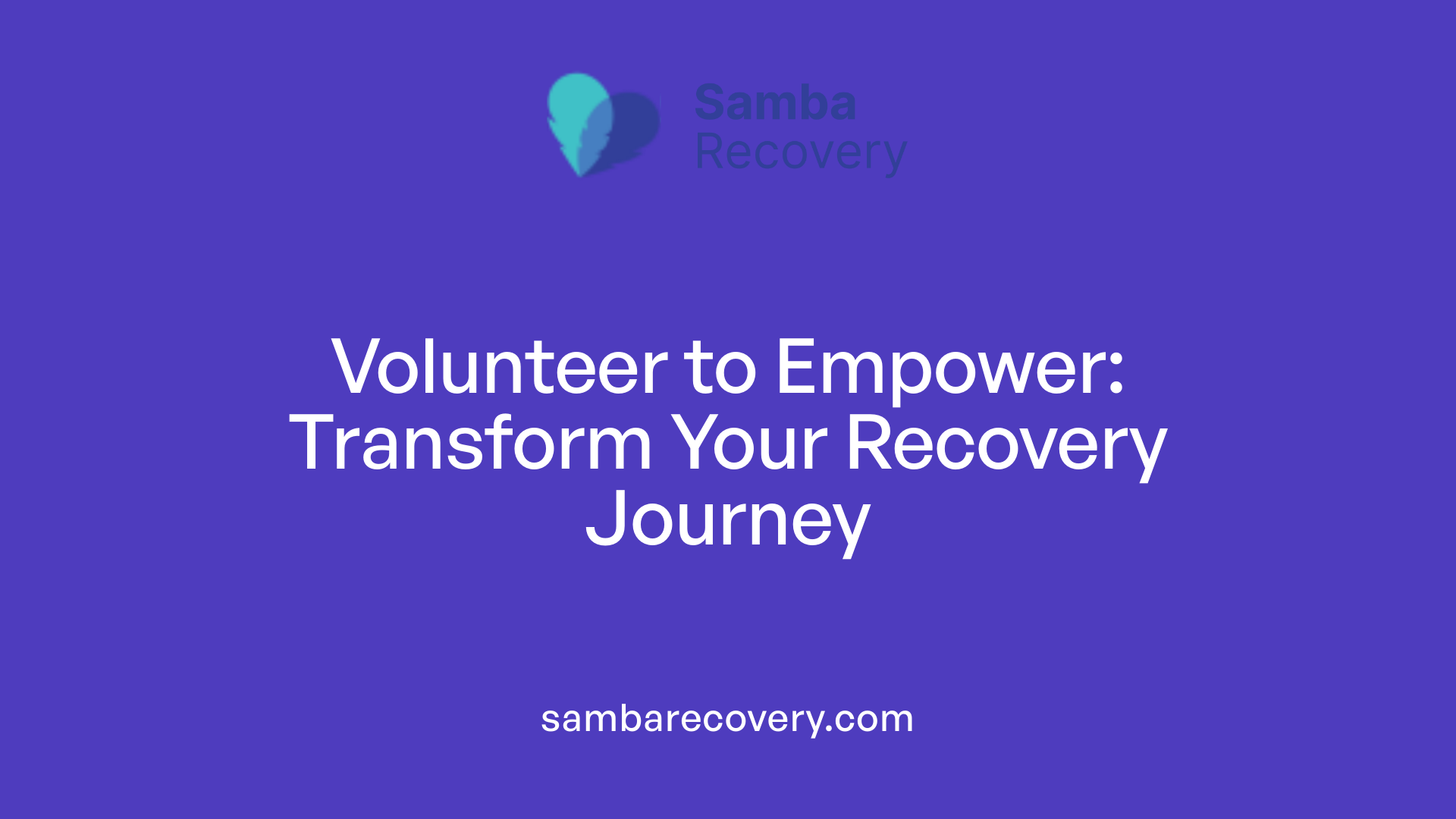
Why is being of service important in recovery?
Helping others through community service and volunteering plays a vital role in maintaining sobriety and fostering personal growth. Engaging in service work allows individuals in recovery to develop gratitude and a positive outlook, which are essential for building resilience. It encourages a focus beyond oneself, promoting a sense of purpose and helping to rebuild self-esteem.
Participation in volunteer activities creates a structured routine, offering regular opportunities for connection and responsibility. This structure can be especially beneficial during vulnerable times, reducing the risk of relapse. Moreover, giving back enhances emotional well-being, as it fosters feelings of accomplishment and belonging.
Serving others also supports community building, which provides ongoing encouragement and support. By helping others, individuals reinforce their commitment to sobriety and develop healthy habits that promote long-term recovery. Overall, being of service is a powerful tool that not only benefits the community but also empowers individuals on their road to a sober and meaningful life.
Support Groups: The Backbone of Recovery
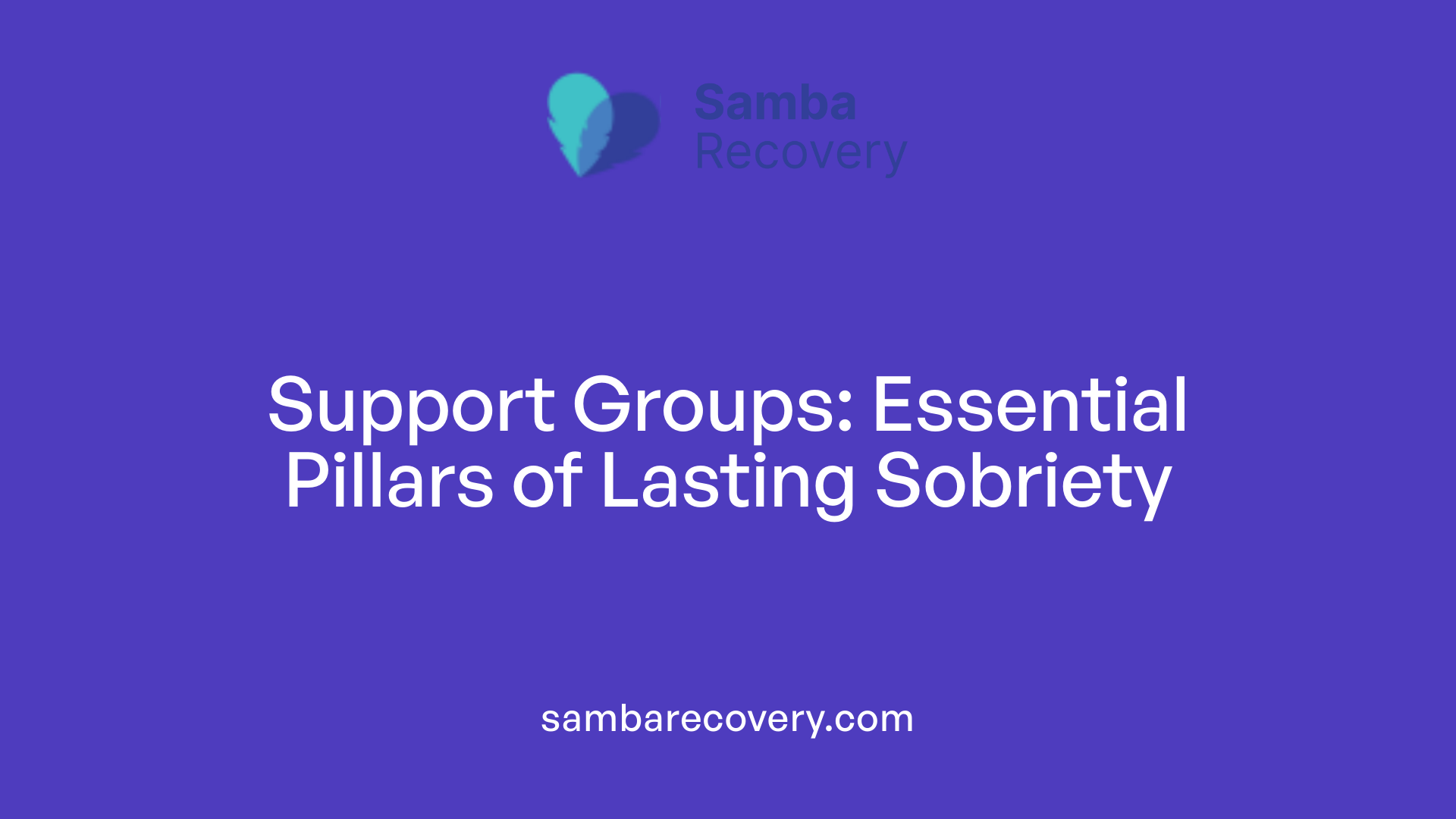
Why are support groups important in recovery?
Support groups are essential in addiction recovery because they create a sense of belonging and mutual understanding among individuals who face similar challenges. These groups reduce feelings of loneliness and isolation, which are common triggers for relapse. Participants can openly share personal stories and feelings, gaining emotional comfort from others who truly understand their journey.
Support groups also serve as a platform for exchanging coping strategies, providing practical advice that can be applied in everyday life. Connecting with others who are on the same path boosts hope and self-empowerment, helping individuals feel less alone and more motivated to stay sober.
Beyond emotional relief, support groups often act as a complement to clinical treatment. They fill support gaps that health professionals and family members might not address fully, offering ongoing encouragement.
Overall, these groups foster resilience, build confidence, and contribute positively to long-term recovery outcomes. However, it’s important that participation is guided carefully to avoid potential pitfalls, such as sharing inaccurate information or privacy breaches.
Types and benefits of support groups
Support groups come in various forms tailored to specific needs and preferences. Some of the most prominent include 12-step programs like Alcoholics Anonymous (AA) and Narcotics Anonymous (NA). These groups operate on shared principles of mutual aid and accountability.
Other options include SMART Recovery, which focuses on science-based strategies, and dual diagnosis groups like Dual Recovery Anonymous (DRA) that address co-occurring mental health issues.
Support groups provide several benefits:
| Type of Group | Focus Area | Typical Activities | Special Features |
|---|---|---|---|
| 12-step programs | Alcohol and drug addiction | Sharing stories, sponsorship | Spiritual component, tradition-based |
| SMART Recovery | Evidence-based self-help | Skill-building sessions | Focus on self-management |
| Gender-specific groups | Women or men’s recovery | Peer sharing, support | Addresses gender-related issues |
| Secular groups | Non-religious approaches | Group discussion | Emphasizes personal responsibility |
| Dual diagnosis groups | Addiction & mental health | Integrated therapy | holistic care approach |
Participating regularly in these groups can lead to higher abstinence rates, increased engagement with treatment, and a reduction in relapse chances.
Shared experiences fostering resilience
Fellowship within support groups cultivates a sense of shared purpose. Hearing others’ stories and struggles fosters empathy and understanding.
This mutual support enhances resilience by demonstrating that recovery is possible, fostering hope even during setbacks.
Active engagement also helps build new skills, such as effective communication and emotional coping strategies, which are vital during recovery.
Additionally, helping others in the group can boost self-esteem and strengthen personal commitment. The collective environment creates a safe space for vulnerability, growth, and sustained sobriety.
In conclusion, support groups are more than just a resource—they are a cornerstone of the recovery process, providing emotional anchors, practical strategies, and a resilient community for lasting sobriety.
Building a Strong Social Support Network
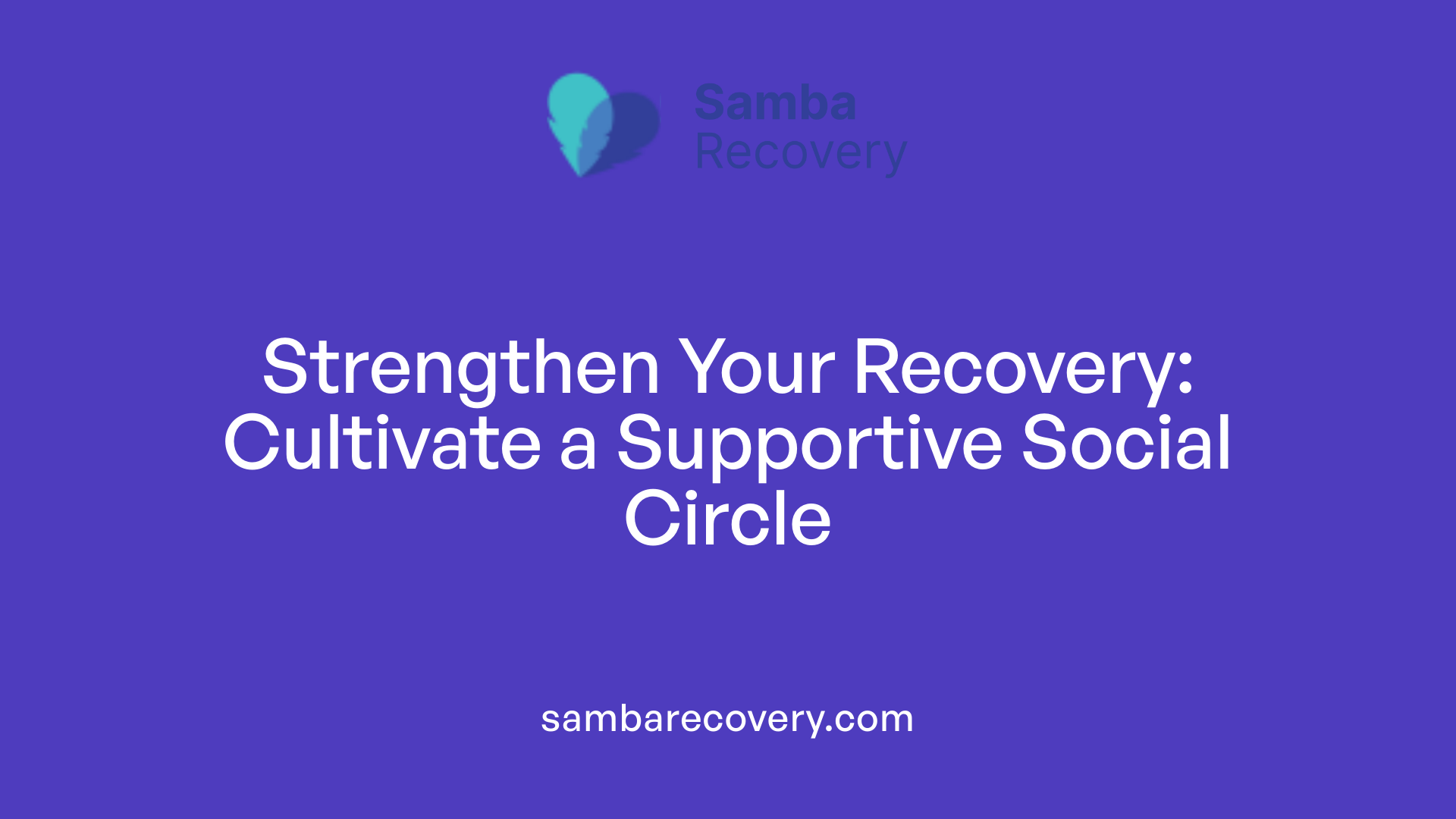
Why is having a supportive social circle important during addiction recovery?
A robust social support network plays a vital role in helping individuals stay sober. It offers a sense of belonging and emotional safety, which are essential in the challenging journey of recovery. Family, friends, and support groups such as 12-step programs create a community where people feel understood and encouraged. These connections help reduce feelings of isolation, a common trigger for relapse. Practical support like transportation, employment assistance, or simply companionship enhances stability and motivation. Community involvement makes recovery feel more sustainable and less lonely, giving individuals a fighting chance to maintain their sobriety long-term.
How does social support build self-efficacy?
Social support boosts confidence and belief in one’s ability to stay clean. When people share their experiences and receive encouragement, they develop greater trust in their capacity to overcome hurdles. Mentors, sponsors, and peer groups provide feedback and reassurance, increasing self-efficacy—a belief that they can manage cravings, cope with stress, and maintain healthy routines. The sense of being part of a caring community motivates individuals to set and pursue recovery goals, paving the way for lasting sobriety.
Why is engagement in sober social activities important?
Participating in sober social activities helps rebuild a fulfilling lifestyle beyond substance use. These activities include community service, hobbies, outdoor pursuits, and support group events. They provide enjoyable, substance-free environments where individuals can form new friendships and strengthen existing ones. Such involvement enhances mental health, reduces cravings, and fosters a sense of purpose. Most importantly, it helps individuals learn new skills, develop healthy routines, and experience the joy of living a balanced life. Engaging in these positive activities makes recovery more meaningful and sustainable, ultimately supporting a lifetime of sobriety.
| Aspect | Benefit | Example |
|---|---|---|
| Emotional support | Provides comfort and reassurance | Family, friends, counseling |
| Practical support | Addresses everyday needs | Transportation, employment help |
| Community involvement | Builds a sense of belonging | Volunteer work, support groups |
| Skill development | Encourages personal growth | Hobby classes, sports, education programs |
| Routine and structure | Fosters stability | Regular meetings, planned activities |
Overall, nurturing supportive relationships and engaging in sober activities are fundamental steps in maintaining long-term recovery. Building this social foundation empowers individuals, reinforces positive behaviors, and creates a network that sustains sobriety through shared encouragement and purpose.
Research Insights into Community Service
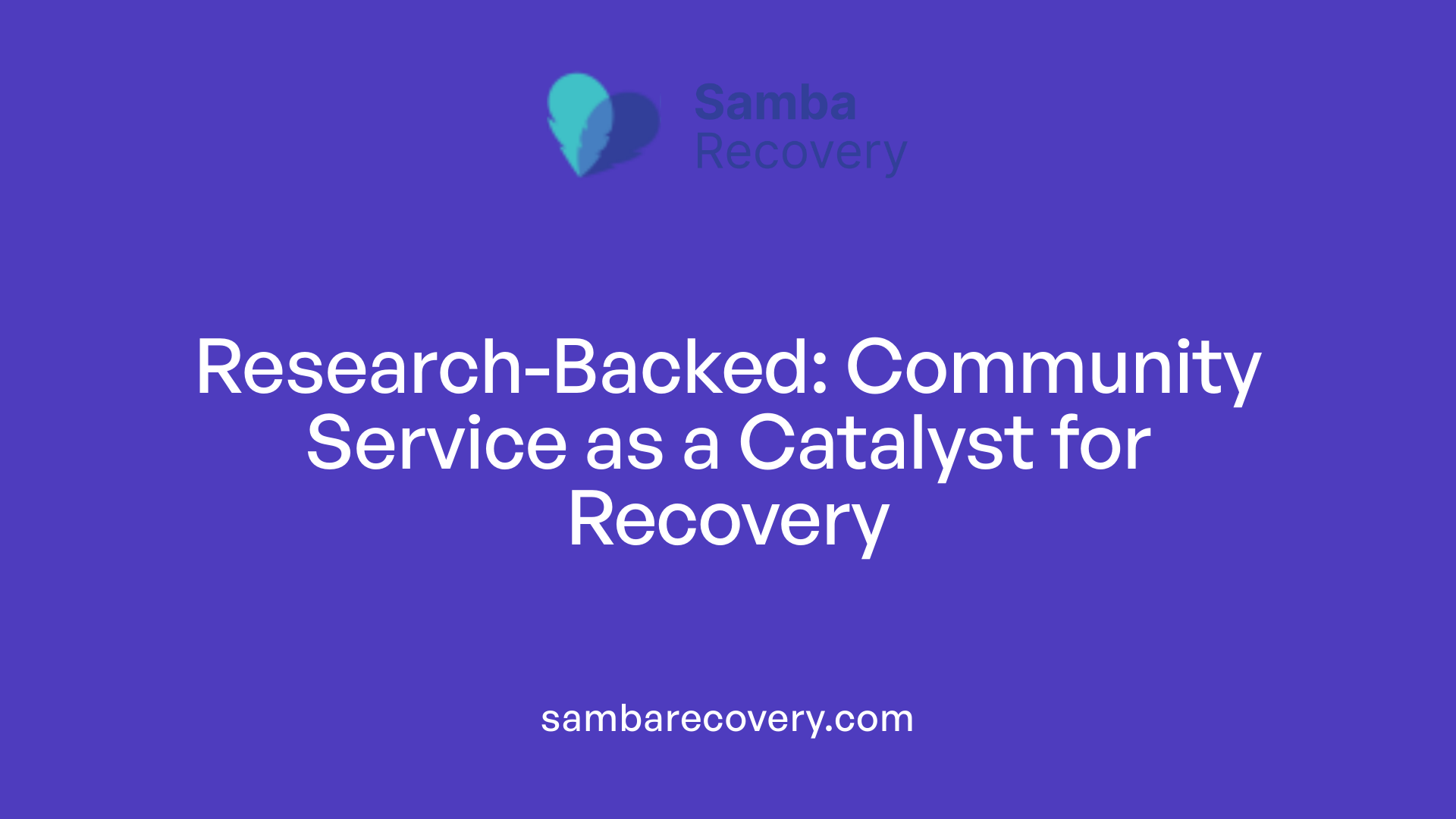
What empirical evidence exists on the effectiveness of community service in recovery?
Research indicates that engaging in community service and peer support activities significantly benefits individuals recovering from addiction. Evidence from various studies shows that recovery programs incorporating community involvement, such as support groups and volunteering, tend to have higher success rates in maintaining sobriety.
Recovery-focused environments like recovery high schools, colleges, and homes show increased rates of continued sobriety, reduced relapse occurrences, and improvements in both academic and personal well-being. These settings foster social connections and provide resources that support recovery.
Peer support workers and volunteer-led activities help clients stay engaged with their treatment plans and build supportive social networks. They also boost self-esteem and overall quality of life. Randomized controlled trials and observational studies reveal that community-based recovery programs can lower the risk of relapse and support long-term abstinence.
While the current body of evidence is considered moderate, it underscores the importance of social support and community involvement in sustained recovery efforts. Overall, empirical studies affirm that community engagement plays a crucial role in improving recovery outcomes and providing a foundation for lasting sobriety.
Empowerment Through Engagement
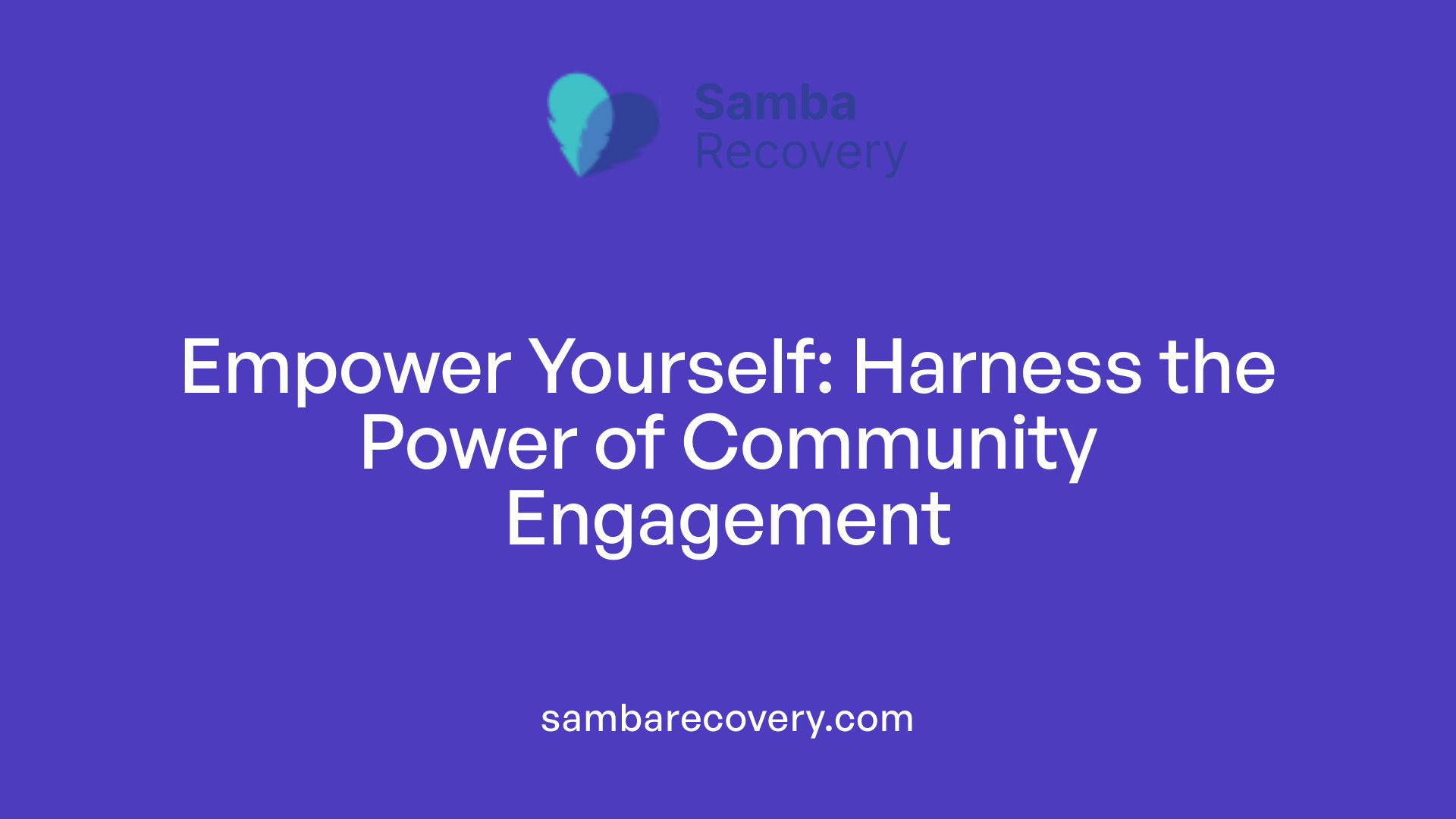
Role of community centers in recovery
Community centers serve as vital hubs that support individuals in addiction recovery by offering a safe and welcoming environment. These centers provide a variety of programs, including support group meetings, counseling services, vocational training, and recreational activities. They foster a sense of belonging and emotional healing, which are crucial for sustaining sobriety. By creating connection and community, centers help reduce feelings of isolation, a common challenge during recovery.
Educational opportunities and workshops
Many community centers also host educational workshops designed to equip individuals with practical skills and knowledge necessary for maintaining long-term sobriety. These may include life skills training, relapse prevention programs, and health and wellness sessions. Such programs empower individuals to understand their addiction better, develop new coping strategies, and reconnect with their communities in meaningful ways.
Building recovery capital
Building recovery capital involves enhancing both internal and external resources that support sustained sobriety. Community centers contribute significantly by offering resources like peer mentoring, employment assistance, and social activities. These efforts help individuals develop confidence, social skills, and supportive relationships. Engaging in educational and community-based activities makes recovery more sustainable, offering hope and resilience against relapse.
| Aspect | Features | Benefits |
|---|---|---|
| Support networks | Peer groups, mentoring, community activities | Reduces isolation, provides encouragement |
| Educational programs | Workshops, skill-building sessions, relapse prevention | Enhances self-efficacy and practical knowledge |
| Recovery resources | Housing support, employment help, wellness programs | Boosts confidence, promotes stability |
Community centers are essential allies in addiction recovery, providing the tools, support, and environment necessary for individuals to rebuild their lives with purpose and resilience.
Conclusion
Community service is a cornerstone of comprehensive addiction recovery, linking individuals to crucial support systems and offering opportunities for personal growth. Engaging in community service and support networks provides a sense of purpose, reinforces positive behaviors, reduces isolation, and builds social connections vital for overcoming addiction. As individuals embark on their recovery journey, exploring and engaging with community resources can offer the empowerment needed to sustain long-term sobriety. Understanding and participating in community initiatives promote healing, resilience, and a meaningful life beyond addiction.
References
- The Role of Community and Support Systems in Addiction Recovery
- The Benefits Of Volunteering In Addiction Recovery – Isaiah House
- The Benefits of Volunteering in Addiction Recovery
- Benefits of peer support groups in the treatment of addiction – PMC
- The Importance of Building a Community in Addiction Recovery
- The Role of Community in Your Recovery
- Enabling or Engaging? The Role of Recovery Support Services in …






